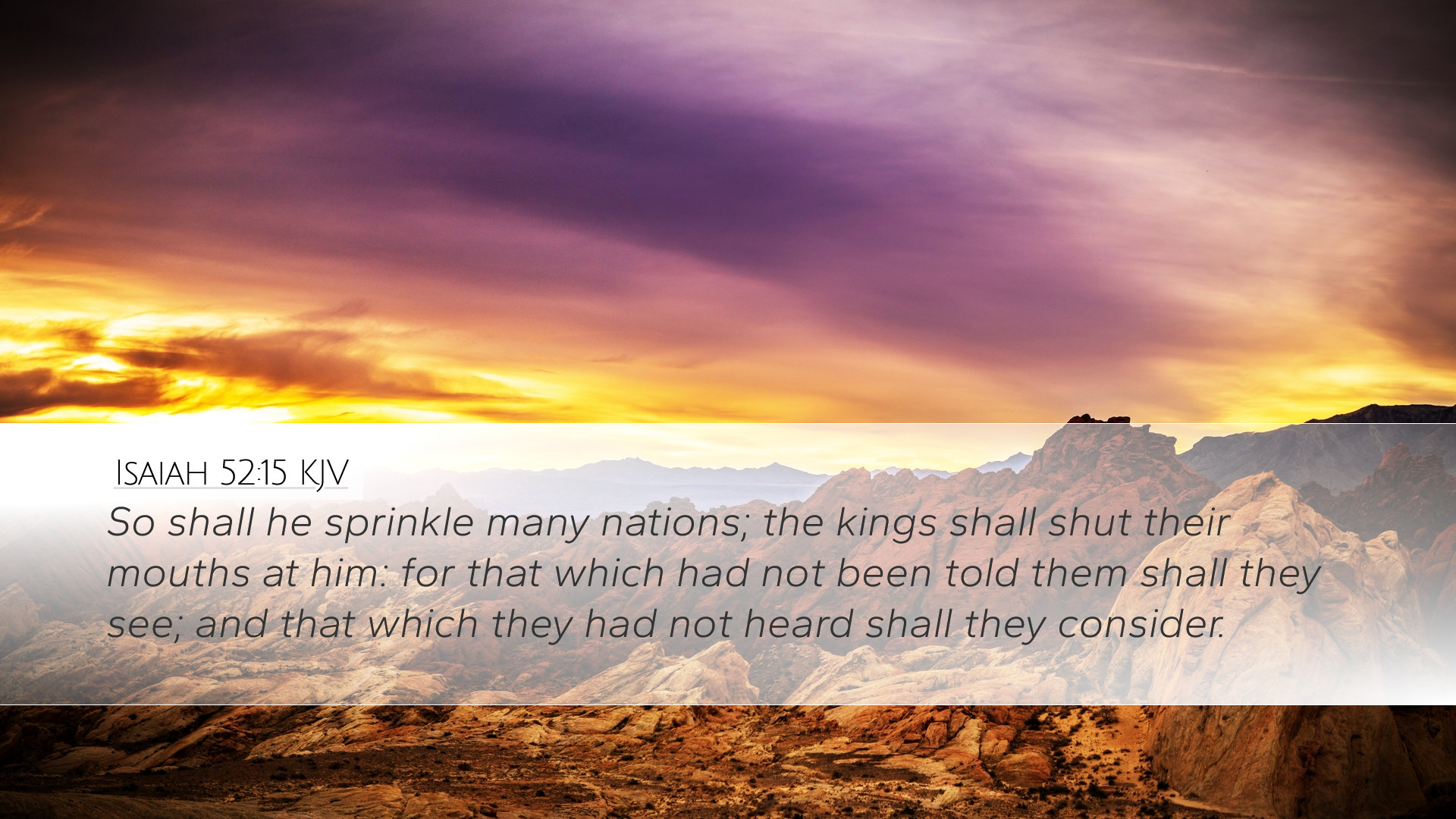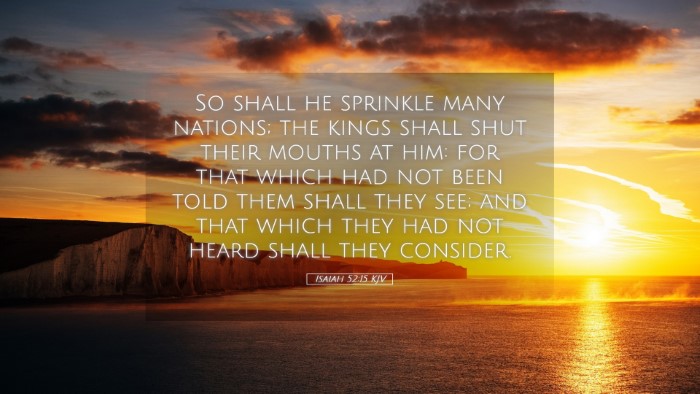Isaiah 52:15 Commentary
Verse: "So shall he sprinkle many nations; the kings shall shut their mouths at him: for that which had not been told them shall they see; and that which they had not heard shall they consider."
Introduction
The prophetic declaration found in Isaiah 52:15 serves as a profound climax in the discourse concerning the Servant of the Lord. This verse encapsulates the essence of the Messianic mission, highlighting both the unimaginable impact of His suffering and the awe-inspiring revelation of His glory. The commentaries of Matthew Henry, Albert Barnes, and Adam Clarke shed light on pivotal theological themes, which we explore below.
The Meaning of 'Sprinkle'
Matthew Henry suggests that the term 'sprinkle' signifies the act of consecrating and purifying. In the Old Testament context, this word often relates to the ceremonial practices of the priests who would sprinkle blood on the altar, symbolizing atonement. Here, it heralds the washing and sanctification of many nations through the blood of the Messiah, indicating a broader redemption that transcends Israel.
Albert Barnes expands this idea by interpreting 'sprinkle' as the act of cleansing from guilt. He emphasizes that the Messiah’s work will be not only for Israel but will encompass the Gentile nations, thus asserting the universal scope of divine mercy. The shedding of covenant blood cleanses not only individual sinners but promises inclusion into the family of God.
Adam Clarke elaborates on the implications of this sprinkling. He notes that the Servant’s sacrificial death will extend far beyond the confines of the Jewish people to the entirety of humanity, emphasizing that grace will be poured out on all who believe, thereby fulfilling the prophecies of earlier texts.
The Kings' Silence
Isaiah frames the reaction of the kings as a demonstration of profound awe and astonishment. Matthew Henry interprets this silence as an acknowledgment of the far-reaching authority and magnificence of the Servant. These earthly rulers, who once wielded power, find themselves rendered mute before the glory of God’s salvation.
Adam Clarke points out that the kings’ inability to speak at witnessing the work of the Messiah suggests a deep realization of their own limitations in comparison to divine power. This silent reverence reflects a theme throughout Scripture where earthly powers are subjected to the sovereignty of God.
Albert Barnes emphasizes the kings’ newfound understanding, portraying their silence as a result of their astonishment at God's unfolding plan which had, until then, remained largely hidden. Their mouths are shut due to the overwhelming revelation of truth that surpasses human comprehension.
The Unheard and Unseen
The verse culminates in the revelation that the kings and nations will contemplate truths that were previously unknown. Matthew Henry emphasizes the notion that the redemptive works of Christ unveil mysteries about God’s nature and plan that were once shrouded in obscurity. This revelation invites ongoing reflection and deeper understanding among the nations.
Albert Barnes points out that the concepts shared in this verse involve a call to consideration among leaders and nations alike. The acknowledgment of divine majesty and redemptive work compels a response that transforms perspectives, pressing them to reflect upon what they had not previously understood or believed.
Adam Clarke articulates that God acts in ways that defy human logic and understanding. The revelation of Christ serves as a catalyst for a significant shift in perspectives, prompting leaders and nations to grapple with spiritual truths that are critical for their understanding of God’s kingdom.
Theological Implications
- Universal Salvation: The message of Isaiah 52:15 challenges theological boundaries by confirming that salvation is available to all humanity, not just to Israel. This foreshadows the Great Commission and the mission to spread the gospel.
- Glorification through Suffering: The passage presents a paradox where through suffering, the Servant attains recognition and reverence. This theme resonates with the New Testament's portrayal of Christ’s crucifixion, which leads to His exaltation.
- A Call to Reflection: The text urges pastors and theologians to invite congregants and communities to reflect deeply on the implications of Christ's sacrifice, spurring spiritual growth and deeper understanding of God's plan.
Conclusion
The significance of Isaiah 52:15 extends far beyond the immediate context of its writing; it encapsulates the core of Christian faith in the person and work of Jesus Christ. Both through His suffering and consequent glory, the Servant arises as a stark reminder of God’s unfathomable grace, inviting all—kings and commoners alike—to behold the beauty of redemption. As we engage with this text, may we be inspired to share this revelatory message to all nations, prompting them to see and consider the depths of God’s profound mercy.


